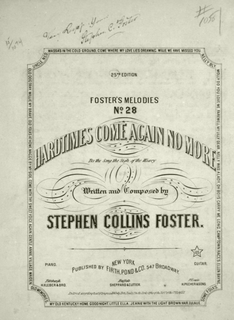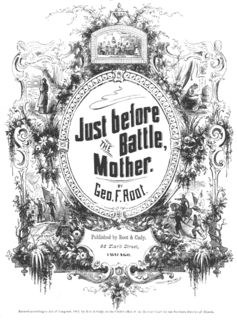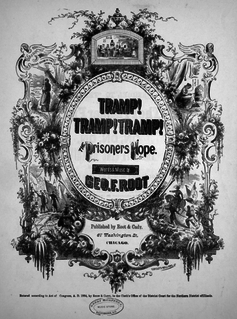"Heart of Oak" is the official march of the Royal Navy of the United Kingdom. It is also the official march of several Commonwealth navies, including the Royal Canadian Navy and the Royal New Zealand Navy. It was also the official march of the Royal Australian Navy, but has now been replaced by the new march, "Royal Australian Navy".

"America " is an American patriotic song, the lyrics of which were written by Samuel Francis Smith. The melody used is the same as that of the national anthem of the United Kingdom, "God Save the Queen". The song served as one of the de facto national anthems of the United States before the adoption of "The Star-Spangled Banner" as the official U.S. national anthem in 1931.

A refrain is the line or lines that are repeated in music or in poetry; the "chorus" of a song. Poetic fixed forms that feature refrains include the villanelle, the virelay, and the sestina.

Hardtack is a simple type of biscuit or cracker, made from flour, water, and sometimes salt. Hardtack is inexpensive and long-lasting. It is used for sustenance in the absence of perishable foods, commonly during long sea voyages, land migrations, and military campaigns.
"O Fair New Mexico", the regional anthem of the U.S. state of New Mexico was officially selected as the state song in 1917. It was adopted as the state song by an act of the New Mexico legislature, approved on March 14, 1917, as signed by New Mexican governor Washington E. Lindsey.

"Simple Gifts" is a Shaker song written and composed in 1848, generally attributed to Elder Joseph Brackett from Alfred Shaker Village.
For The Dear Old Flag, I Die is an American Civil War song. It was originally a poem written by George Cooper. The music by Stephen Foster was later added in. The song interprets the last words of a brave little drummer boy who was fatally wounded at the Battle of Gettysburg.
"Over the Hills and Far Away" is a traditional British song, dating back to at least the late 17th century. One version was published in Thomas D'Urfey's Wit and Mirth, or Pills to Purge Melancholy; a very different one appeared in George Farquhar's 1706 play The Recruiting Officer. A version also appears in John Gay's The Beggar's Opera of 1728.

"Hard Times Come Again No More" is an American parlor song written by Stephen Foster. It was published in New York by Firth, Pond & Co. in 1854 as Foster's Melodies No. 28. Well-known and popular in its day, both in America and Europe, the song asks the fortunate to consider the plight of the less fortunate and ends with one of Foster's favorite images: "a pale drooping maiden".
"Buckeye Battle Cry", composed by vaudeville performer and songwriter Frank Crumit, is one of two fight songs of the Ohio State Buckeyes. Every football game in Ohio Stadium begins with Ramp entrance by The Ohio State University Marching Band, performed to "Buckeye Battle Cry". The tradition of Script Ohio ends with the singing of one chorus of the fight song by band members. The song is also played after every Buckeye score.

"Just before the Battle, Mother" was a popular song during the American Civil War, particularly among troops in the Union Army. It was written and published by Chicago-based George F. Root. It was also a popular song with adherents of the Primrose League in England, and was a central part of Victoria Day celebrations in Canada during the late 19th and early-to-mid 20th centuries.

"Tenting on the Old Camp Ground" was a popular song during the American Civil War. A particular favorite of enlisted men in the Union army, it was written in 1863 by Walter Kittredge and first performed in that year at Old High Rock, Lynn, Massachusetts.
"Song to Old Union" is the alma mater of Union College in Schenectady, New York. It was written by Fitz Hugh Ludlow for Union's 1856 commencement ceremonies. It is sung each year at graduation, although it is the rare student or alumnus who knows more than the first verse and chorus.
"Song of the Falklands" is the unofficial anthem of the Falkland Islands. It was written in the 1930s by Christopher Lanham, a Hampshire schoolteacher, while working on West Falkland.

"Come, Come, Ye Saints" is one of the best-known Latter-day Saint hymns. The lyrics were written in 1846 by Mormon poet William Clayton. The hymn has been called the anthem of the nineteenth-century Mormon pioneers.
"Botany Bay" is a song that can be traced back to the musical burlesque, Little Jack Sheppard, staged at The Gaiety Theatre, London, England, in 1885 and in Melbourne, Australia, in 1886. The show was written by Henry Pottinger Stephens and William Yardley, with music composed and arranged by Wilhelm Meyer Lutz. The show's programme credits "Botany Bay" as "Old Air arr. Lutz", and the more recent crediting of the music for "Botany Bay" to Florian Pascal, is totally spurious. Florian Pascal was the pseudonym of Joseph Williams, Jr. (1847–1923), a music publisher and composer who published the show's music. Pascal composed other numbers in the score but received no credit for "Botany Bay".

"Tramp! Tramp! Tramp! " was one of the most popular songs of the American Civil War. George F. Root wrote both the words and music and published it in 1864 to give hope to the Union prisoners of war. The song is written from the prisoner's point of view. The chorus tells his fellow prisoners that hope is coming.
"Good Bye, Old Glory" is a song published on September 29, 1865, after the end of the American Civil War. The words are by L. J. Bates with music by George Frederick Root.
Blow the Wind Southerly is a traditional English folk song from Northumberland. It tells of a woman desperately hoping for a southerly wind to blow her lover back home over the sea to her. It is Roud number 2619.









